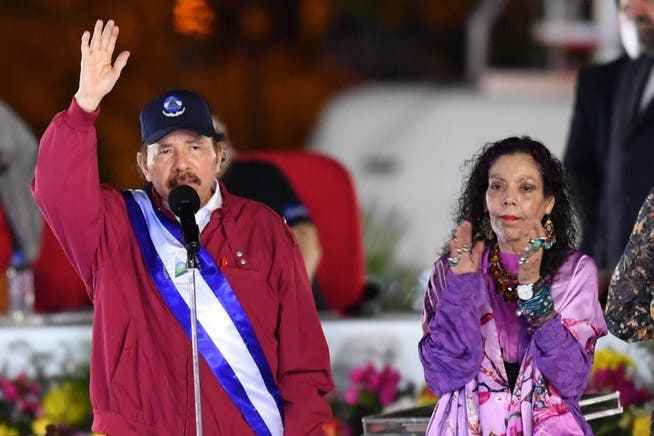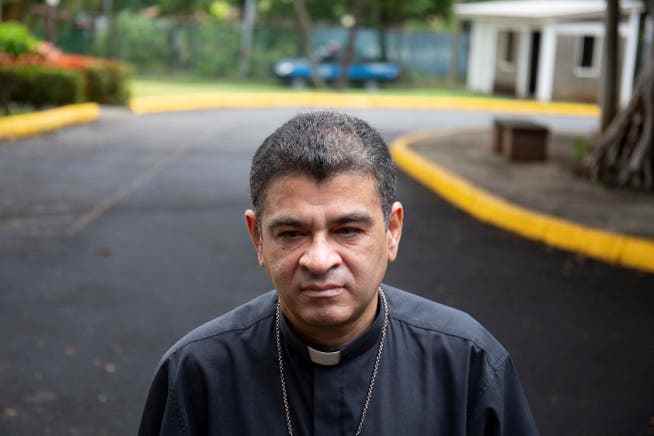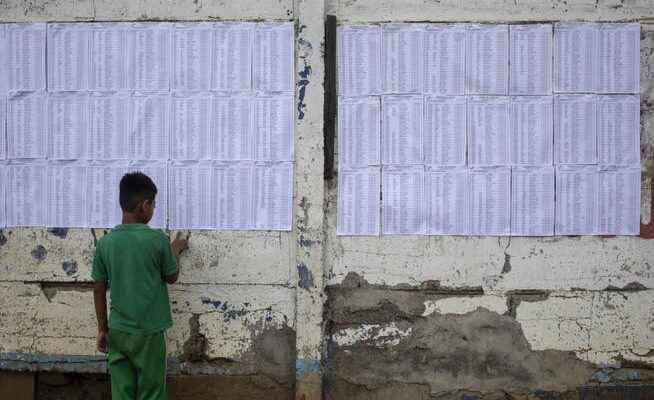Since his return to power in 2006, the former revolutionary hero Daniel Ortega has eliminated opposition and critics step by step. Now his party has also taken power in all communities.
A child looks at voter rolls for the November 6 local elections in Managua. According to the OAS, the minimum conditions for free and fair elections in Nicaragua were not met.
On November 6th, Nicaragua elected new local governments. The “electoral victory” of the Sandinista governing party FSLN of long-term ruler Daniel Ortega was once again outstanding: his party won in all 153 communities in the country. The FSLN had previously governed 141 municipalities. Overall, the party got around 74 percent of the votes, the electoral authority said. The remaining votes went to five small parties, which were allowed to take part in the elections in order to simulate democratic competition.
The real opposition parties didn’t even take part in the local elections. Because their leaders are either in the El Chipote torture prison in the capital Managua or in exile. The spokesman for the opposition alliance Unidad Nacional Azul y Blanco spoke from neighboring Costa Rica, in whose capital San José many persecuted politicians from Nicaragua have sought refuge. The elections were a farce, said Héctor Mairena. The turnout was actually much lower than the official 53 percent.
The independent election observation organization Urnas Abiertas confirmed Mairena’s statement. Only a little more than 17 percent of the citizens went to vote. The organization also contradicted official statements that the elections were peaceful. According to Urnas Abiertas, there have been 31 arrests and protests against election rigging. The indigenous alliance Yatama, which is only running on the Caribbean coast, said it won the elections, not the FSLN. In videos on social networks, protests by indigenous people are said to be visible.
Brutal repression against members of the opposition
Former Marxist revolutionary Ortega helped lead the 1979 Sandinista revolution to overthrow then-dictator Anastasio Somoza Debayle. After governing the country in the 1980s, he was voted out of office in 1990. Since returning to power in the 2006 elections, he seems determined not to relinquish it. Together with his wife and Vice President Rosario Murillo, he rules with an iron fist. He brutally suppressed student protests in early 2018, killing between 300 and 500 people; Thousands of opposition figures went into exile.

Daniel Ortega and his wife and Vice President Rosario Murillo at the inauguration for another five years on January 10, 2022.
In the run-up to the November 2021 presidential election, the couple then arrested dozens of opposition politicians, including all presidential candidates, and other unwelcome critics. Ortega even had former comrades-in-arms from the fight against Somoza locked up. Officially, the president then won the elections with 76 percent of the votes. The opposition and the international community spoke of a farce.
But Ortega does not tolerate contradictions and criticism. In April he expelled the representatives of the Organization of American States (OAS) from the country, and in September the EU ambassador Bettina Muscheidt had to go. Both the OAS and the EU had called for an end to human rights violations and the release of political prisoners.
The Catholic Church is also targeted
For several months, Ortega has also been launching his frontal attack against the Catholic Church, which for a long time was officially silent about Ortega’s abuse of power. In recent years, she then tried to mediate between the conflicting parties. Eventually, however, clergymen also had to leave the country, and some priests were even imprisoned after criticizing Ortega. The Bishop of Matagalpa and Estelí, Rolando Álvarez, is under house arrest. Church radio stations have been shut down.

The Bishop of Matagalpa and Estelí, Rolando Álvarez, was forced to seek refuge from Sandinista police in a church in Managua in May 2022.
Ortega countered criticism of the church with the accusation that it was “a perfect dictatorship and a perfect tyranny”. “Who elects the priests, who the bishops, and who the pope and the cardinals? How many votes did they get?” Ortega asked rhetorically. According to Ortega, the church is also behind anti-government protests, and people are trying to kill him. The church is using the bishops in Nicaragua to stage a coup d’etat.
Support from China and Russia
He has been making the same accusation against the government in Washington for years. Like the EU, the latter is reacting to Ortega’s dictatorship with regular tightening of sanctions against the presidential family, his closest associates, but also entire sectors of the economy, such as mining. The trade in gold from Nicaragua was banned. With little success: Ortega and his family – eight children have long held key positions in government and the economy – continue to have a firm grip on the country.
In view of the hopeless situation, surveys show that more than half of the residents want to leave the country. The number of migrants leaving the country has recently increased. In September, US Border Patrol agents arrested more than 18,000 illegal Nicaraguan migrants, up 55 percent from August. Meanwhile, Daniel Ortega is leaning more and more closely towards Russia and China. In July, Russian soldiers came to the Central American country for joint maneuvers. Meanwhile, China is arming Nicaragua’s police force.
In Latin America, on the other hand, Ortega is threatened with increasing isolation. In recent months, the American government has made efforts to improve relations with Cuba and Venezuela. The two countries are Ortega’s last socialist friends in the region.
